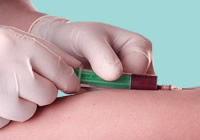回家路的博客
这一生,我们都在走在回家的路上!
Infectious mononucleosis, also known as kissing disease is an infectious disease caused by a virus of the herpes family called Epstein-Barr virus (EBV).
It transmitted through saliva. Mono is most common in adolescents and young adults and is characterized by symptoms of fever, sore throat and swollen lymph nodes.
The Epstein-Barr virus is transmitted from human to human through saliva. For this reason it earned the nickname "the kissing disease". In addition to kiss, mononucleosis can be spread through coughing, sneezing, objects such as cups and cutlery or otherwise where there is contact with the saliva of an infected person.
Symptoms
Typical symptoms of mononucleosis include fever, fatigue, sore throat and swollen lymph nodes in the neck (lumps). It is very similar to pharyngitis caused by other viruses and bacteria. Other nonspecific symptoms, such as headache, muscle aches, coughs and nausea are also common. In mononucleosis fatigue is often severe and persists for weeks after the resolution of the picture.
Enlarged lymph nodes in infectious mononucleosis are a bit different from the lymph nodes of common pharyngitis and affect mainly the posterior neck chains often spreading to the rest of the body. A tip for the differential diagnosis between bacterial pharyngitis and mononucleosis is that in the latter there may be the appearance of a rash (red spots) on the body after the initiation of antibiotics, mainly amoxicillin.
A classic situation is that patients seek a doctor for strep throat and get a prescription of amoxicillin for treatment. The patient begins to take antibiotics and red spots appear hours later through the body.
Another characteristic sign of mononucleosis is an enlarged spleen, called splenomegaly. When this occurs, it is necessary to rest because of the risk of rupture. The splenic rupture (ruptured spleen) is rare but when it happens it takes the risk of death due to heavy bleeding that happens. The spleen increases size which can be palpable below the ribs on the left abdomen.
Liver involvement is not uncommon and can lead to the development of hepatitis with jaundice in 20% of cases. Other described complications, but less common, are the Guillain-Barré syndrome and facial paralysis.
Mononucleosis usually does not cause problems when gained during pregnancy. No evidence of increased risk of malformations, miscarriage or premature birth.
Diagnosis

Blood test
In the CBC mononucleosis is a typical finding increasing the number of leukocytes (leukocytosis) caused by increased production of lymphocytes (lymphocytosis), i.e., the patient has leukocytosis and lymphocytosis.
When the liver is affected, there may be elevated liver enzymes, SGOT and SGPT calls. The definitive diagnosis, however, is done by serology for antibodies. The most common is a simple test called monotest.
Treatment
For many years chronic fatigue syndrome was associated with mononucleosis. However, today it is known that fatigue is different from mononucleosis. The prolonged fatigue that may occur is not normally associated with the other symptoms of the syndrome and reactivation usually runs weaker than virus.
http://www.tabletsmanual.com/wiki/read/mononucleosis




